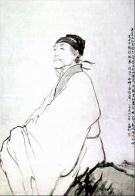| What is the life story of Du Fu? Du Fu (about712-770) was born in China and raised as a Confucian in a prominent but declining family of scholar-officials. In the Six Dynasties period his ancestors were in the service of the southern courts; his grandfather Du Shenyan, was an important poet of the early Tang dynasty, and a more remote ancestor, Du Yu (222-84), was a famed Confucianist and military man. Despite family connections,? Du Fu had difficulty achieving patronage and governmental postings, and twice failed the Imperial Examinations, in 735 and 747. In 744 Du Fu met Li Bai, and this formed the basis for one of the world's most famous
| 
|
literary friendships; two poets devoted a number of poems to each other. In 751 Du Fu passed a special examination through submitting rhyme-prose works directly to the emperor, but it wasn't until 755 that he was offered a rather humiliating post in the provinces which he rejected, accepting instead the patronage of the heir apparent. In the winter of that year, the An Lushan Rebellion broke out, and the emperor fled to Sichuan, abdicated, and the heir apparent became the new emperor in Gansu province. Meanwhile, the rebels seized the capital, and Du Fu, attempting to join the new emperor in the distant northwest, was captured by the rebels. He was detained for a year, but managed to escape, and after traveling in disguise through the occupied territory, joined the emperor's court in the position of Reminder. He was arrested when trying to defend a friend, a general who had failed to win a battle, but was pardoned and exiled to a low posting in Huazhou. Then he quit his job there, and moved to Chengdu, where he and his family depended upon the kindness of friends and relatives, and moved again and again to avoid banditry and rebellions. In spite of this instability, his poems show serenity in this period, particularly those from 760-762, when he lived in a thatched hut provided by a patron and friend named Yan Yu, who hired him in the years that followed as a military adviser. After Yan's death in 765, Du Fu left Chengdu, traveling down the Yangtze River, finding patrons and dreaming of a return to Changan, but being prevented by invasions from Tibet. He spent his final three years traveling on a boat, detained in sickness, and finally winding down to his death as he journeyed down the Yangtze, apparently accepting the withering away of his health and life. |